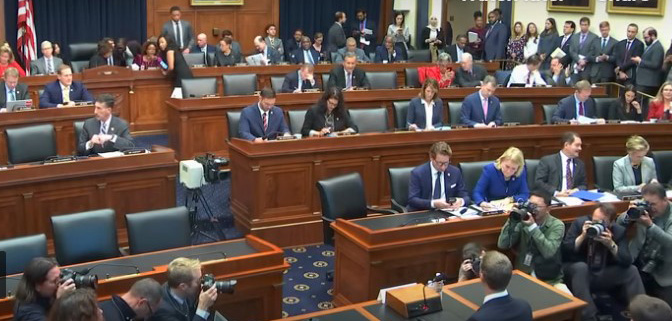
MBA Letter Outlines Fiscal 2021 Budget Priorities

(The House Financial Services Committee meets, from 2020.)
The Mortgage Bankers Association, in a Feb. 10 letter to the House Financial Services Committee, outlined several priorities it supports as the committee wrestles with its markup of the federal government’s fiscal 2021 budget.
MBA Senior Vice President of Legislative and Political Affairs Bill Killmer said MBA has welcomed extension of unemployment insurance and other income supports, as well as Troubled Debt Restructurings relief, under the Consolidated Appropriations Act of 2021 last year.
“We see these policies working in tandem to continue to support housing markets, tenants, landlords and homeowners in addressing the ongoing effects of the pandemic,” Killmer wrote. “In the aftermath of the enactment of that legislation, MBA continues to support the need for additional rental assistance for tenants, broad-based homeowner assistance, and enhancements to the Paycheck Protection Program to help the hospitality sector.”
MBA outlined three specific areas of concern for fiscal 2021:
Rental Assistance
A recent report by the MBA Research Institute for Housing America found an estimated $27 billion was owed in back rent by the end of 2020, despite the impacts of previous COVID-19 relief efforts. In December, Congress passed the Consolidated Appropriations Act of 2021, which included $25 billion for Emergency Rental Assistance, which MBA said is helping households that are struggling or have struggled to pay rent because of the pandemic.
“MBA supported this provision in December and continues to support additional ERA, including the $25 billion included in Title IV of the Budget for Fiscal Year 2021,” the letter said. “MBA believes that the funds already appropriated will be critical in helping stave off evictions and preserve shelter for millions of families, and that additional resources similarly will be critical to help meet the emerging challenges in this market.”
Homeowner Assistance Fund
MBA said it appreciates and supports Title IV of the Committee’s mark, which would authorize roughly $10 billion of funding for a Homeowner Assistance Fund. “Direct assistance provided through state housing finance agencies would help homeowners with COVID-19 hardships by supporting mortgage payments; providing funding for deeper loan modifications; assisting with utility payments, property tax and insurance payments, and homeowner association dues; and offering other support to prevent the loss of home equity, mortgage delinquency, default, or foreclosure,” the letter said.
MBA noted the Homeownership Assistance Fund could prevent widescale foreclosures that would be detrimental to both families and the broader economy. “Along with a broad and diverse set of stakeholders, we would encourage the Committee to consider additional resources for this purpose in the future,” MBA said.
Funding for Housing Counseling Services
MBA supports the $100 million included for housing counseling services. “Housing counseling is critical for consumer awareness to reach borrowers who have missed one or more mortgage payments because of the COVID-19 pandemic and may be eligible for forbearance assistance under the CARES Act or other forms of mortgage payment relief,” the letter said. “These services target borrowers whose forbearance plans are ending and who need to contact their servicer to extend that form of payment relief or request additional assistance.”
MBA noted despite “robust outreach efforts” by servicers, some borrowers are not responding and are at risk of losing access to home retention options. “These counseling funds will augment the existing communications efforts by servicers and counseling agencies and support virtual events for homeowners in need of assistance,” MBA said. “By ensuring availability of these services, borrowers in need will be aware of their options to avoid foreclosure.”
The House Financial Services Committee is expected to consider the budget reconciliation bill when it reconvenes later this month.
